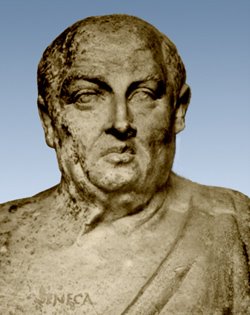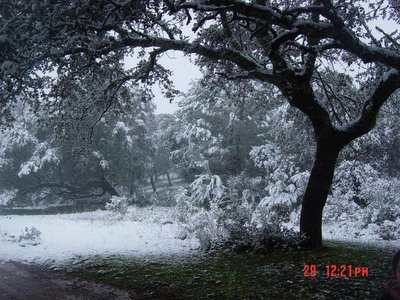[Versión de esta anotación en español:
aquí]
The phrase “Après moi, le déluge” (“After me, the deluge") is attributed to the King of France
Louis XV (1710-1774):

According to another interpretation, the phrase may have been coined not by the king himself, but by his most famous lover, Madame de Pompadour (1721-1764):

In any case, the phrase had a certain prophetic quality, if we interpret it
post eventum as alluding to the breaking out of the
French Revolution (1789-1799), which took place fifteen years after the king’s death and which cost the life of his grandson and successor, Louis XVI.
As a first approach to the saying, note that one is dealing with a nominal phrase, that is, without an explicit verb. The phrase can have two distinct, though related, meanings, according to the verb which we implicitly supply:
a) On the one hand, if we understand
After me the deluge will come, the saying seems to imply, as an assertive affirmation: “After my reign, the nation will be plunged into chaos and destruction.”
b) The verb could also be understood as a subjunctive concession:
After me, let the deluge come (it can come, but it makes no difference to me). In this second case, the speaker asserts that nothing that happens after his disappearance matters to him.
We will trace the classical antecedents of this famous expression, and I already anticipate that practically all of these antecedents will coincide more with notion b) than with a).
It seems that there existed in Greece an expression or proverbial saying which is preserved in verse in a fragment of a tragedy whose author has not been identified (
Tragicorum Fragmenta Adespota, 513 Nauck):
ἐμοῦ θανόντος γαῖα μιχθήτω πυρί·
οὐδὲν μέλει μοι· τἀμὰ γὰρ καλῶς ἔχει.
When I die, let earth and fire mix:It matters not to me, for my affairs will be unaffected.It is significant that
Seneca (4 B.C.- 65 A.D.) alludes to this phrase in his treatise
De Clementia, addressed to Nero and composed in the year 56 A.D. Seneca paraphrases the Greek phrase in Latin, and denounces it as an egotistical and unhelpful apothegm:

illud mecum considero multas voces magnas, sed detestabiles, in vitam humanam pervenisse celebresque volgo ferri, ut illam: 'oderint, dum metuant,' cui Graecus versus similis est, qui se mortuo terram misceri ignibus iubet, et alia huius notae.
In my heart of hearts I consider that many pompous expressions, though execrable, pass for true among the human race and are frequently repeated by the people, as for example: “Let them hate me, so long as they fear me.” To which is similar the Greek verse of one, who urges that, once he is dead, the earth be mixed with the fires, and other expressions of the same ilk
The Latin poet
Lucretius (99-55 B.C.) wrote his didactic poem
De rerum natura in order to diffuse, under the clothing of verse, the Epicurean philosophy through Rome. One of the postulates of Epicureanism is that the human soul is mortal; therefore, one need not fear death, since once dead we will no longer have either consciousness or sensory perception. Lucretius, in order to convincingly express this notion, argues that we will feel nothing once we are dead, even though enormous cataclysms might occur. These cataclysms consist in the earth mixing with the sea, and the sea with the heavens. The mixture of earth and sea can be understood as a form of flooding or inundation; so it clearly anticipates Louis XV’s phrase:
scilicet haud nobis quicquam, qui non erimus tum,
accidere omnino poterit sensumque movere,
non si terra mari miscebitur et mare caelo. (3.840-842)
Certainly then, when we do not exist, nothing
at all will be able to happen to us nor excite our senses,
not even if the earth mixes with the sea, and the sea with the heavens.Although it does not exactly contain a mention of a flood or of other catastrophes, I cannot resist recalling here a witticism attributed to the
Cynic philosopher Diogenes (412-323 B.C.), and transmitted by Cicero. From this anecdote as well can be inferred the conviction that one must not worry about the evils which can arise after our death:
durior Diogenes, et is quidem eadem sentiens, sed ut Cynicus asperius: proici se iussit inhumatum. tum amici: 'volucribusne et feris?' 'minime vero' inquit, 'sed bacillum propter me, quo abigam, ponitote.' 'qui poteris?' illi, 'non enim senties.' 'quid igitur mihi ferarum laniatus oberit nihil sentienti?' (Tusculanae Disputationes 1.43.104)
Diogenes was more radical and, though certainly sharing the same opinion, harsher, as the cynic he was: he ordered that he should be cast away without burial. Then his friends objected to him: “Like fodder for birds and beasts?” No, in no way,” he responded. “Rather, place a little stick next to me, so that I may frighten them off.” They said, “How could you? For you will not be conscious.” And he concluded: “Therefore, how will being shredded by beasts harm me, if I will not be conscious?”.In an epigram of the Greek poet
Strato of Sardis, from a later era (2nd and 3rd centuries A.D.), the lyrical subject calls on the enjoyment of life (the
carpe diem). He wishes to enjoy sensory pleasures while he lives; on the other hand, once dead, it matters not to him whether comes the deluge:
Καὶ πίε νῦν καὶ ἔρα, Δαμόκρατες· οὐ γὰρ ἐς αἰεὶ
πιόμεθ’ οὐδ’ αἰεὶ παισὶ συνεσσόμεθα.
καὶ στεφάνοις κεφαλὰς πυκασώμεθα καὶ μυρίσωμεν
αὑτούς, πρὶν τύμβοις ταῦτα φέρειν ἑτέρους.
νῦν ἐν ἐμοὶ πιέτω μέθυ τὸ πλέον ὀστέα τἀμά·
νεκρὰ δὲ Δευκαλίων αὐτὰ κατακλυσάτω.
(Greek Anthology 11.19)
Drink and love now, Damocrates, for we shall notdrink for ever or be for ever with the lads.Let us bind our heads with garlands and scent ourselvesbefore others bear flowers and scent toour tombos.Now may my bones inside me drink mostly wine,and when they are dead let Deucalion's flood cover them.[English translation: W. R. Paton]Geraldus Bucoldus translated this ancient Greek epigram into Latin in the Renaissance. In Spanish literature,
Diego Hurtado de Mendoza (1503-1575) composed a sonnet which is a re-creation of the epigram (for a recitation of this text, click
here):
LXII
SONETO
Demócrates, deléitate y bebamos,
que para siempre no se ha de durar.
No puede para siempre el hombre estar
en la vida que ahora nos holgamos.
Pues nos perdemos cuanto acá dejamos,
con ungüento oloroso nos untar
y en guirnaldas las frentes coronar
se procure, que al fin al fin llegamos.
La honra que nos hace la mortaja
quiéromela yo hacer en este mundo
y remojarme en cuanto vino sé.
Y si de acá me llevo esta ventaja,
cuando después llegare en el profundo
¡ahógueme el diluvio de Noé!
Democrates, take delight and let us drink,
For one cannot live forever.
Man cannot forever be in this life
Which now we are enjoying.
For we lose whatever we leave here,
Let us endeavor to anoint ourselves
With aromatic oil, and to crown our brows with garlands,
For we finally near our end.
The honor which the shroud does us
I wish it to do me in this world
And to wet my throat with what wine I know.
And if I have this advantage here,
When I later arrive in the depths,
Let Noah’s flood drown me![English translation: Dennis Mangan]In sum, from this journey through the classical (as well as modern) antecedents of the royal phrase issue two main facts: 1) practically all of the examples cited suggest that the French king’s phrase means: “It matter not at all to me whether, after my death, the flood or any other catastrophe comes”; 2) the idea that we must not worry about what happens after our death is quite widespread in classical antiquity, and belongs to the ideologies of several philosophical schools (Epicureanism, Cynicism) but, more specifically, the mention of the deluge in this context is documented in both Lucretius and Strato of Sardis. It is difficult to ascertain whether Louis XV (or Pompadour) was directly inspired by one of these two poets, or whether he coined the phrase independently. In my opinion, it is not implausible that a king as hedonistic as Louis XV could have read and assimilated Lucretius and, moreover, could have taken the Lucretian passage as a source of inspiration for his very famous phrase.
[English translation of the post:
Dennis Mangan]
Technorati tags:
Après moi le déluge,
After me the deluge,
Lucretius,
Strato of Sardis,
Cicero,
Diego Hurtado de Mendoza,
Diogenes the Cynic,
Louis XV,
Madame de Pompadour,
carpe diem,
Seneca the Younger,
De clementia.
Labels: tópicos literarios, Tradición Clásica













